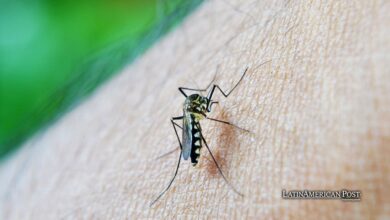Deadly Salmonella Outbreak: Mexico Shuts Down Cantaloupe Plant
Mexico's government suspended a Sonora cantaloupe plant amid investigations into a salmonella outbreak causing fatalities in the U.S. and Canada.

Photo: Freepik
The Latin American Post Staff
Escucha este artículo
Leer en español: Brote mortal de Salmonella: México cierra planta de melón
Government Intervention in Response to Salmonella Outbreak
Mexico's government has taken decisive action by temporarily shutting down a cantaloupe processing plant in the northern state of Sonora. This move comes as part of an ongoing investigation into salmonella contamination linked to at least nine deaths in the United States and Canada. The closure reflects the seriousness with which Mexican authorities address this public health crisis.
The Mexican health officials initiated the plant's suspension after conducting two thorough inspections, during which they collected samples from various surfaces and water sources. The results of these tests are eagerly awaited, as they could provide crucial insights into the source of the contamination.
Alarming Figures from CDC and PHAC
The U.S. Centers for Disease Control and Prevention (CDC) and Canada's Public Health Agency (PHAC) have reported alarming figures: at least nine fatalities and hundreds of illness cases attributed to salmonella since October. The breakdown of these tragic deaths includes four in the U.S. and five in Canada, as reported by Canadian media outlets.
This health crisis has been linked to the Malichita and Rudy brand cantaloupes, leading to recalls of these products in both countries. However, attempts to reach representatives from Malichita and Rudy for comments have been unsuccessful.
In a proactive response, batches of potentially contaminated cantaloupes have been returned to Mexico from the United States. In a statement, the Mexican government emphasized its commitment to preventing these compromised products from entering the market, showcasing its dedication to public safety.
This incident is not isolated in the realm of food safety concerns. Mexico had previously issued warnings about peaches, plums, and nectarines suspected of Listeria contamination under the HMC Farms brand imported from the U.S. This alert followed notifications from U.S. health officials to their Mexican counterparts, highlighting the importance of international cooperation in managing food safety risks.
Critical Role of Cantaloupe Plant Closure
The closure of the cantaloupe processing plant in Sonora is a critical measure in controlling this outbreak. It demonstrates Mexico's willingness to take swift and effective action in the face of a public health emergency. The government's response is essential in tracing the source of the contamination, ensuring food safety, and preventing further illnesses and fatalities.
Beyond the immediate response, this situation underscores the need for stringent food safety protocols and international collaboration in monitoring and managing foodborne illnesses. The interconnected nature of the global food supply chain means that food safety is not just a national concern but a global one.
Also read: Brazil and Central America at the Heart of Mercon's Bankruptcy Saga
As investigations continue, the focus must remain on identifying the root cause of the contamination to implement corrective measures and prevent future outbreaks. This incident serves as a reminder of the critical importance of food safety standards and the need for ongoing vigilance in the food production and distribution processes.
The Mexican government's decision to suspend operations at the cantaloupe processing plant in Sonora is a commendable step in addressing this severe salmonella outbreak. It reflects a commitment to public health and safety, both domestically and internationally. As the investigation progresses, it is hoped that this swift action will contribute to a deeper understanding of foodborne illnesses and strengthen measures to safeguard the public against similar threats in the future.




